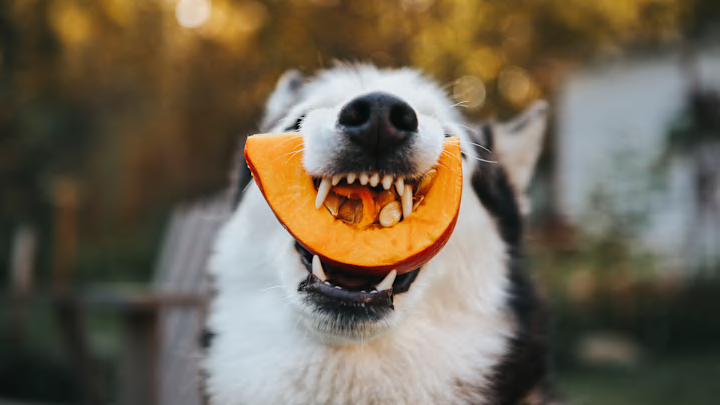Pumpkins are an inescapable part of the fall season. You’ll see them on porches, as coffee flavors and on cereal boxes in stores, and even as a David S. Pumpkins Halloween special on NBC. But some pet owners don't wait until the holiday is in full swing: They serve up canned pumpkin to their dogs and cats year-round, having heard it’s an excellent source of fiber. But is it safe?
Is pumpkin safe for dogs and cats to eat?
Small amounts of pumpkin are safe for cats and dogs. Unlike other holiday foods, it isn’t toxic and shouldn’t warrant an emergency trip to the vet. However, you should make sure you don’t overdo it and only feed your animal a small amount. A tiny serving of pure pumpkin puree (Chewy’s resident veterinarian suggests 1 teaspoon per 10 pounds of body weight for dogs) can make for a tasty treat, as can plain pumpkin seeds. Cats can also handle small amounts of plain, cooked pumpkin.
Make sure you stick to plain pumpkin. And never attempt to get rid of your old Halloween jack-o-lanterns by tossing them in Fluffy or Fido’s bowl. Those old, carved pumpkins tend to get nasty pretty quickly, and their stems are covered in prickly hairs that can cause irritation and damage (they also don’t taste the best).
Does pumpkin help with digestion?
According to the American Kennel Association, pumpkin contains fiber and minerals that may help ease a dog’s digestion. But it isn’t that simple.
Just because pumpkin is technically safe for your pets doesn’t mean you should instantly start adding it to their meals. According to veterinarian Lisa Freeman, who authored a piece for Tufts University in 2017, domesticated pets don’t actually require fiber as part of their diet, but some might benefit from fiber’s ability to ease bowel issues or contribute to satiety on a low-calorie diet. The problem with using pumpkin as a source of that fiber, Freeman wrote, is that there’s simply too little of it to be of much use. A medium-sized dog would need 12 cups of pumpkin a day to see any benefit.
Compounding the questionable wisdom of feeding pets pumpkin is the fact that the canned varieties often have additives that might not sit well with your furry friend. Pumpkin pie mix is loaded with sugar, which can lead to weight gain; dogs or cats with heart or kidney issues might also see adverse effects from the sodium found in processed pumpkin. There’s also the fact that canned pumpkin is often comprised of different squashes, which may or may not have the same intended health benefits.
If you think your pet would benefit from more fiber, ask your vet for recommendations.
A version of this story originally ran in 2017; it has been updated for 2023.
